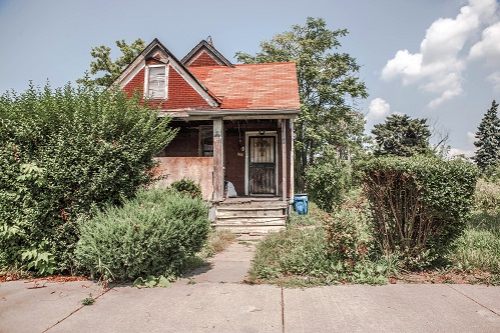- How does a homeowners insurance claim work?
- How long do home insurance claims take?
- How to make the home insurance claim process quicker
- How long does it take for a home insurance claim to be approved?
- What can delay a home insurance claim payment?
- How long does it take for home insurance to pay out?
- How long do homeowners insurance claims stay on your record?
- How long can a home insurance claim stay open?
- How filing a home insurance claim can affect your rates
- FAQ: Home insurance claims
How does a homeowners insurance claim work?
When you contact your insurance company, they will guide you through the initial steps and assign an insurance adjuster to your case. The adjuster will assess the damage and determine the amount of the claim. It’s important to understand the difference between actual cash value and replacement cost claims.
An actual cash value policy will reimburse you for the depreciated value of your damaged property, while a replacement cost policy will cover the cost of replacing the damaged items with new ones. Knowing these details can help you better manage your expectations and the overall claims process.
How long do home insurance claims take?
The home insurance claims process varies depending on the claim type, but states have laws that outline how long the insurance company has to respond. Some state laws don't specify a specific time frame for insurance payouts and only grant a "reasonable" amount of time to either deny or pay a claim.
It's important to note that an initial claim check for home insurance may not be the total claim settlement amount. In a replacement cost claim, the insurer will issue a check for the depreciated value of the repaired or replaced property. Once repairs are done and the final cost is known, a second check to cover the remainder of the replacement cost will be issued. The mortgage lender must be included in the insurance payment process to ensure that funds are used for the necessary repairs, as lenders have a financial interest in the property.
However, all of this may take much longer than the timelines below, depending on the scope of the repairs. Find your state's laws about home insurance claims processing time below.
| State | Number of days for claims processing |
|---|---|
| Alabama | 30 days |
| Alaska | 30 days |
| Arizona | 30 days |
| Arkansas | 15 days |
| California | 40 days |
| Colorado | No unreasonable delays |
| Connecticut | No unreasonable delays |
| Delaware | No unreasonable delays |
| District of Columbia | No unreasonable delays |
| Florida | 30 days |
| Georgia | No unreasonable delays |
| Hawaii | No unreasonable delays |
| Idaho | No unreasonable delays |
| Illinois | No unreasonable delays |
| Indiana | No unreasonable delays |
| Iowa | No unreasonable delays |
| Kansas | No unreasonable delays |
| Kentucky | 30 days |
| Louisiana | 30 days |
| Maine | 30 days |
| Maryland | No unreasonable delays |
| Massachusetts | No unreasonable delays |
| Michigan | 60 days |
| Minnesota | 30-60 days |
| Mississippi | 25-35 days |
| Missouri | No unreasonable delays |
| Montana | 30 days |
| Nebraska | No unreasonable delays |
| Nevada | No unreasonable delays |
| New Hampshire | 30 days |
| New Jersey | No unreasonable delays |
| New Mexico | 45 days |
| New York | No unreasonable delays |
| North Carolina | No unreasonable delays |
| North Dakota | No unreasonable delays |
| Ohio | As soon as possible |
| Oklahoma | 60 days |
| Oregon | No unreasonable delays |
| Pennsylvania | 15 days |
| Rhode Island | No unreasonable delays |
| South Carolina | No unreasonable delays |
| South Dakota | No unreasonable delays |
| Tennessee | No unreasonable delays |
| Texas | 15 days |
| Utah | No unreasonable delays |
| Vermont | 30 days |
| Virginia | No unreasonable delays |
| Washington | No unreasonable delays |
| West Virginia | No unreasonable delays |
| Wisconsin | 30 days |
| Wyoming | 45 days |
For more information, check the website of your state's insurance department.
How to make the home insurance claim process quicker
John Huff, director of the Missouri Department of Insurance, Financial Institutions & Professional Registration and president of the National Association of Insurance Commissioners (NAIC), says homeowners and renters can do several things to expedite their claim:
- Keep a home inventory of your personal property, including pictures and receipts, if possible. This will help document damages to belongings lost or damaged due to an incident.
- Report insurance claims promptly and ensure your insurer has your current contact information.
- Know your rights, read your policy, and comply with the reporting requirements stated in the policy. It's also prudent to know what's required by state law.
- Document your loss. Take photos of the damage before you do any cleanup or repairs. Keep a record of conversations with insurance, repair, jurisdictional government and other professionals.
- Hire a public insurance adjuster who can help move things along.
- Contact the state insurance department if you have concerns or complaints.
PEOPLE ASK
What if my insurance company delays payment?
If your home insurance company is delaying payment, reach out to find out why. If the answer isn't satisfactory, you may need to speak to a lawyer or someone at the state insurance department.
How long does it take for a home insurance claim to be approved?
State law determines how long a home insurance company has to either approve or deny your claim. It may be up to 40 days, but it depends on the complexity of the claim and whether an in-person inspection of the damage is required.
What can delay a home insurance claim payment?
Several things can cause a delay in insurance payments related to claims. Here are four things that can delay your claim:
- Not having the proper paperwork
- Not maintaining a good inventory of your property
- Delays in providing needed information to your insurance company
- Not making temporary repairs to prevent further damage
"Delays [with the claims process] can occur due to questions regarding the cause of loss, submission of incorrect or incomplete information and delayed reporting to the insurer," Huff says.
PEOPLE ASK
What happens if the insurer misses the deadline?
If an insurer misses a legally required deadline, you can file a complaint with the insurance department. However, it's always best to attempt to work out issues with the insurer directly first.
How long does it take for home insurance to pay out?
Once the settlement amount is determined and approved, the insurance company will usually send out a check within days. As mentioned previously, some states do have laws stating how long the insurer has to issue a check. You can expect to have your homeowners insurance claim paid within a few days to a few weeks of the settlement.
How long do homeowners insurance claims stay on your record?
Home insurance claims are reported to a database called the Comprehensive Loss Underwriting report (C.L.U.E.) where they remain on record for seven years.
So even if a claim is not filed with your current insurance company, it remains on a record that is available to all insurers.
How long can a home insurance claim stay open?
Home insurance companies have no fixed time frame to settle a claim, so there is really no average time to settle a home insurance claim. It can take weeks, months or even years. The time it takes to close a claim varies. For instance, a burglary claim might resolve quicker than a claim for a house burned to the ground.
How long your claim will be open depends on the laws of your state, the complexity of the home insurance claim and the insurance company’s claim procedures.
After a major disaster, claims may be open for a long time as the rebuilding process may be slower. Expect delays due to the massive number of claims and the need for cleanup and assessment of large areas before repairs can begin.
How filing a home insurance claim can affect your rates
Filing a home insurance claim can affect your rates, depending on the type and severity of the claim. Policyholders who file multiple claims or claims for significant amounts may see an increase in their rates. However, filing a single claim for a minor issue may not result in a significant rate increase.
It’s essential to understand how filing a claim can impact your rates and to discuss your options with your insurance agent. They can provide insights into how your specific situation might affect your premiums.
FAQ: Home insurance claims
Is there a time limit to file a homeowners insurance claim?
Yes. Each state has laws regarding the statute of limitations on claims, which may differ for property damage vs. injury claims. Homeowners insurance claims should be filed as quickly as possible so that the insurance company can inspect the damage and determine the cause.
Why do insurance companies take so long to pay out?
Before paying out on a claim, the insurance company has to investigate, verify coverage and determine the cost of repairs. Some claims are more complex than others and may require a longer investigation process. If the homeowner has a mortgage, the insurance check for home repairs may need to be endorsed by the mortgage company, ensuring that the lender's financial interest is protected.
How do you report your insurance company to the insurance commissioner?
If you are unable to resolve a dispute with your insurance company or you believe it has engaged in unfair or illegal practices, you can file a complaint with your state’s insurance commissioner or department of insurance. Visit your state’s Department of Insurance website to find out how you should file.
How do you appeal a claims decision from your insurance company?
To appeal a claim decision, you can send a letter to the insurance company with a detailed explanation as to why you believe your claim should be approved.
"Include documentation you've retained through the claim process, including statements from adjusters, correspondence with the company and property appraisals,” Huff says. “Consumers also have the right to hire an attorney and bring an action against an insurer to enforce contractual rights."




